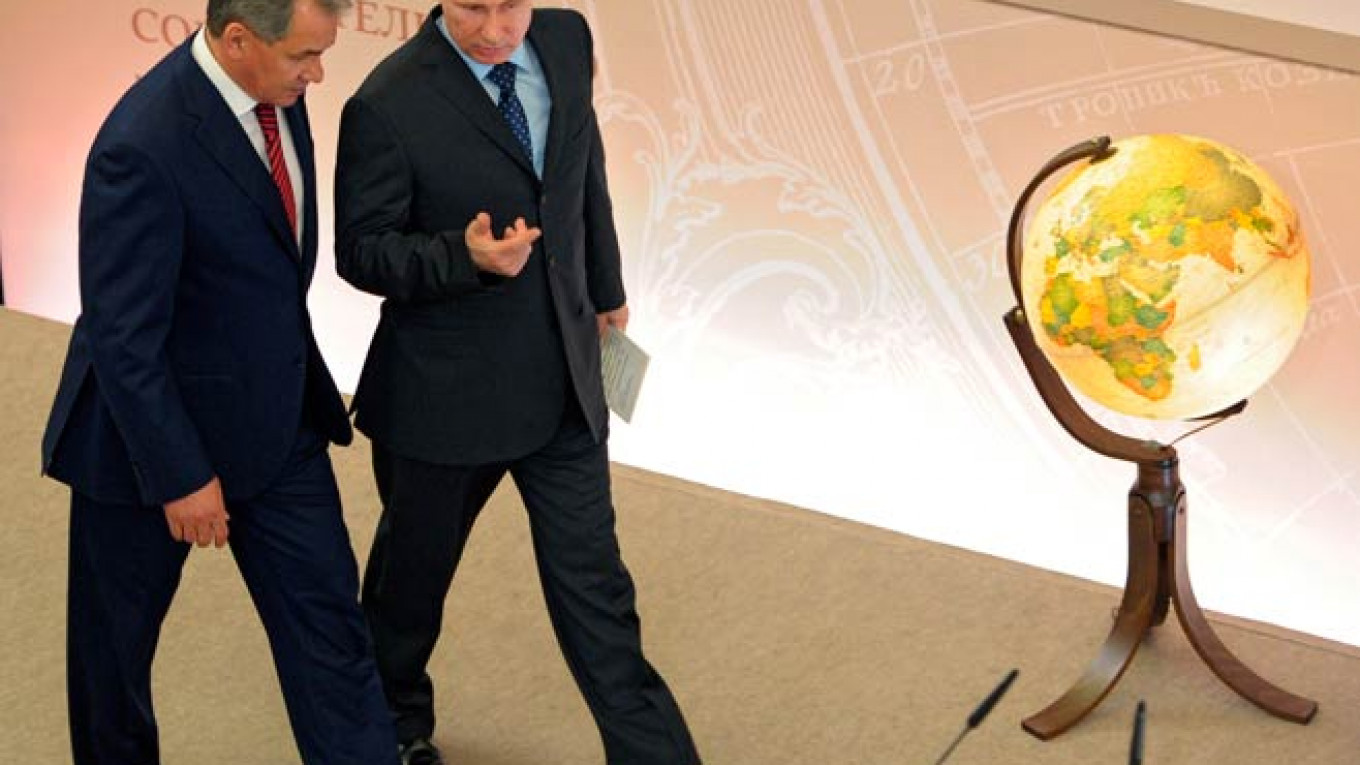President Vladimir Putin chaired a meeting of the Russian Geographical Society on Tuesday, demonstrating the prominence of an organization that was recently revived to promote patriotic sentiment in Russia.
The organization was founded in 1845 by Tsar Nicolas I to foster exploration of Russia's vast territory and its natural riches. The society has never stopped its activities but has changed names multiple times to reflect the fluctuating political context in the country.
In 2009, Defense Minister Sergei Shoigu was elected president of the society, while in 2010 Putin became the head of its board of trustees, putting it under his direct patronage.
In his opening remarks at Tuesday's meeting, held at a library of Moscow State University, Putin said the purpose of the Geographical Society was "to help people know our country, learn how to understand and value its unique natural and cultural diversity and its history."
"We are interested in both projects that have serious scientific potential and those that unite our citizens and young people around captivating and substantive initiatives," Putin said. "This is what the Russian Geographical Society was created for."
Putin is known for his love for outdoor activities and protecting endangered species. He seems to be particularly fond of large cats, having posed multiple times with leopards, and on Tuesday he broke into a joyful smile when pictures were shown of the rare manul cat of the Zabaikalsky region, one of several felines protected through the Geographical Society's Wild Cats of Southern Siberia project.
Putin encouraged the organization to cooperate more closely with other groups that the Kremlin has helped revive, such as the Russian Historical Society, which is chaired by State Duma Speaker Sergei Naryshkin. Since returning to the presidency in 2012, Putin has put forward numerous initiatives designed to promote conservative values and patriotism in Russia. The Soviet title "Hero of Labor" was revived last year and many laws have been passed to quell political activism. The federal government is undertaking a project to create a single set of history textbooks for school children to encourage a positive outlook on Russia's past.
In light of Russia's recently altered political geography, it was announced that the society will open its new branches in Crimea and Sevastopol.
"This region is not only connected with the history of the Russian fleet, but also with the Russian Geographical Society, which more than 150 years ago laid the foundation to the comprehensive exploration of its nature, peoples and archeology," Shoigu told the crowd.
The organization works on a noncommercial basis distributing grants to various environmental, cultural and media projects. It works to protect endangered species and sends regular expeditions to the Arctic to explore the area and clean up environmental damage.
Funding for the organization is provided by some of the richest people in Russia. Some of those patrons, including Viktor Vekselberg, Gennady Timchenko, Alisher Usmanov and other members of Russia's wealthiest list, mingled in the hall before Tuesday's meeting, waving at and hugging each other casually. Russian state media moguls Konstantin Ernst and Oleg Dobrodeyev were also in the crowd.
"During Soviet times we lost our historical memory — very little connects us with people who lived here 100 years ago," said Mikhail Prokhorov, the billionaire tycoon and founder of the Civil Platform political party. "So our goal is to bring everything we can back to the country, so that young people can make use of it."
"Our culture is a part of our great history and all our citizens must have access to it," he told The Moscow Times. "The main thing that differentiates a great country, a country of great culture, is the accessibility of its culture to everyone."
Other movers and shakers discussed the ongoing crisis in Ukraine and the sanctions that some of those who were present are now subject to.
Among those present was also chief executive of British Petroleum Bob Dudley, who sits on the Geographical Society's board of trustees. Dudley told reporters that BP's business in Russia has not suffered from the sanctions. BP owns a 19.75 percent stake in Russia's biggest oil company, Rosneft.
Contact the author at i.nechepurenko@imedia.ru
A Message from The Moscow Times:
Dear readers,
We are facing unprecedented challenges. Russia's Prosecutor General's Office has designated The Moscow Times as an "undesirable" organization, criminalizing our work and putting our staff at risk of prosecution. This follows our earlier unjust labeling as a "foreign agent."
These actions are direct attempts to silence independent journalism in Russia. The authorities claim our work "discredits the decisions of the Russian leadership." We see things differently: we strive to provide accurate, unbiased reporting on Russia.
We, the journalists of The Moscow Times, refuse to be silenced. But to continue our work, we need your help.
Your support, no matter how small, makes a world of difference. If you can, please support us monthly starting from just $2. It's quick to set up, and every contribution makes a significant impact.
By supporting The Moscow Times, you're defending open, independent journalism in the face of repression. Thank you for standing with us.
Remind me later.






